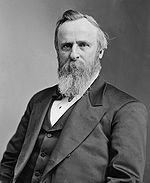How to Pronounce Rutherford B. Hayes
#50
Most Popular
Boost
Oct 04, 1822 Delaware, Ohio, United States Died on 17 Jan 1893 (aged 70)
American politician, 19th President of the United States (in office from 1877 to 1881)
LibraRutherford B. Hayes, Date of Birth, Place of Birth, Family, Facts, Age, Net Worth, Biography and More in FamedBorn.com

American politician, 19th President of the United States (in office from 1877 to 1881)
Libra